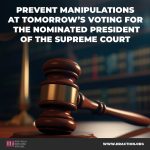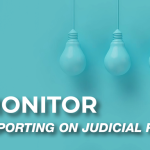25/07/2014 CONSTITUTIONAL COURT FINDS THE THIRD ROUND OF VOTING FOR THE SUPREME STATE PROSECUTOR UNCONSTITUTIONAL
25/07/201401/08/2014 ENSURE THAT THE SAME CRITERIA APPLY FOR ALL CANDIDATES FOR STATE PROSECUTORS
01/08/201426/07/2014 REGARDING ELECTION OF PRESIDENT OF THE SUPREME COURT
Human Rights Action (HRA) regrets the decision of the Judicial Council to go through with the election of the President of the Supreme Court, even though its members were informed that an initiative had been filed with the Constitutional Court to review the constitutionality of the statutory election procedure.
If the Constitutional Court finds the said provisions to be unconstitutional, as was the case with the election procedure for the Supreme State Prosecutor, it would mean that the election of Ms. Vesna Medenica for the Supreme Court President had also been unconstitutional. This would call into question the legality of actions undertaken by Ms. Medenica as the head of the Supreme Court, as well as the work of the Judicial Council, that Medenica is a member of ex officio.
HRA’s initiative for constitutional review submitted to the Constitutional Court, of which the Judicial Council’s President and members were informed a day before the session, points out that provisions of the Judicial Council Act in relation to the election and dismissal of the Supreme Court President are in conflict with the Constitution.
As with prescribing the third round of election for the Supreme State Prosecutor, it again comes to the problem when the law – the act of lower legal force – defines a matter prescribed by the Constitution differently.
The Constitution stipulates that the General Session of the Supreme Court, consisting of all the judges of that Court, proposes a candidate for President of the Court to the Judicial Council. However, the Law on the Judicial Council (Art. 28a) provides that the Judicial Council makes a public announcement, assesses applications and submits a list of candidates who meet the requirements to the General Session of the Supreme Court, which then selects one candidate and nominates him/her to the Judicial Council.
Therefore, on the basis of legal intervention, the General Session does not acquire the names of candidates independently, but is limited to those who have applied to the public announcement, i.e. to a list forwarded to it by the Judicial Council upon assessing candidates’ eligibility for the election. In addition, if the authors of the Constitution wanted a public announcement for the post of President of the Supreme Court, they would have emphasized that in the same manner as in the election of the Supreme State Prosecutor – in Amendment X.
Since the process of electing a new President of the Supreme Court was ongoing, HRA proposed to the Constitutional Court to issue an order until a final decision is reached to suspend individual actions undertaken on the basis of the challenged provisions, i.e. order suspension of the election for the Supreme Court President.
HRA Team







 English
English